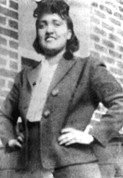
If you've been treated at a university hospital, you may have signed away the rights to your tissues in the name of research. I've signed them, but do we really know what happens to our tissues?
This question is examined in the fascinating bestseller, The Immortal Life of Henrietta Lacks, by Rebecca Skloot. Henrietta was from a working class black family near Baltimore. Doctors at Johns Hopkins University diagnosed the mother of five with cervical cancer in 1951. But the tumor was so aggressive that, even with treatment, she died that year.

Without Henrietta or her family's knowledge, her doctors gave a sample of her tumor to a researcher at Johns Hopkins. Dr. George Gey had been searching unsuccessfully for human cells that could survive indefinitely in the lab. He found it in Henrietta's cells. They're a biomedical marvel - hardy cells that multiply and survive unlike others before.
They became the first line of “immortal” cells – cells that can be frozen and grown indefinitely for research. Since then, Henrietta's cells, named HeLa after the first two letters of her first and last names, have been instrumental in landmark studies.
The Polio vaccine was tested on HeLa cells before its release. Henrietta's cells helped achieve cloning, gene mapping and in vitro fertilization. Eventually HeLa cells were commercialized, generating millions in profits, none of which went to Henrietta's family.
Now a law requires informed consent in research on human subjects. But people sign these forms automatically, giving away the right to their tissues. Having said that, the goal is not to stop cell culturing, a practice that's vital to research. The question is how to do it while weighing an individual's rights.
More Information
The Immortal Henrietta Lacks
CBS News Sunday Morning story on Henrietta Lacks – well done and informative!
“Somewhere in the humble family cemetery off a country road in the town of Clover in southern Virginia, a woman who died nearly 60 years ago lies in an unmarked grave. It is a shame, because the world should know her name: Henrietta Lacks. She was a poor, African-American tobacco farmer, a mother of five children, who died of cervical cancer when she was 31...”
Henrietta Lacks' 'Immortal' Cells
Excellent Smithsonian story on Henrietta Lacks, with an interview of Rebecca Skloot, author of The Immortal Life of Henrietta Lacks.
About the Immortal Life of Henrietta Lacks
Author Rebecca Skloot's website with additional information on Henrietta and the book Skloot wrote about her.